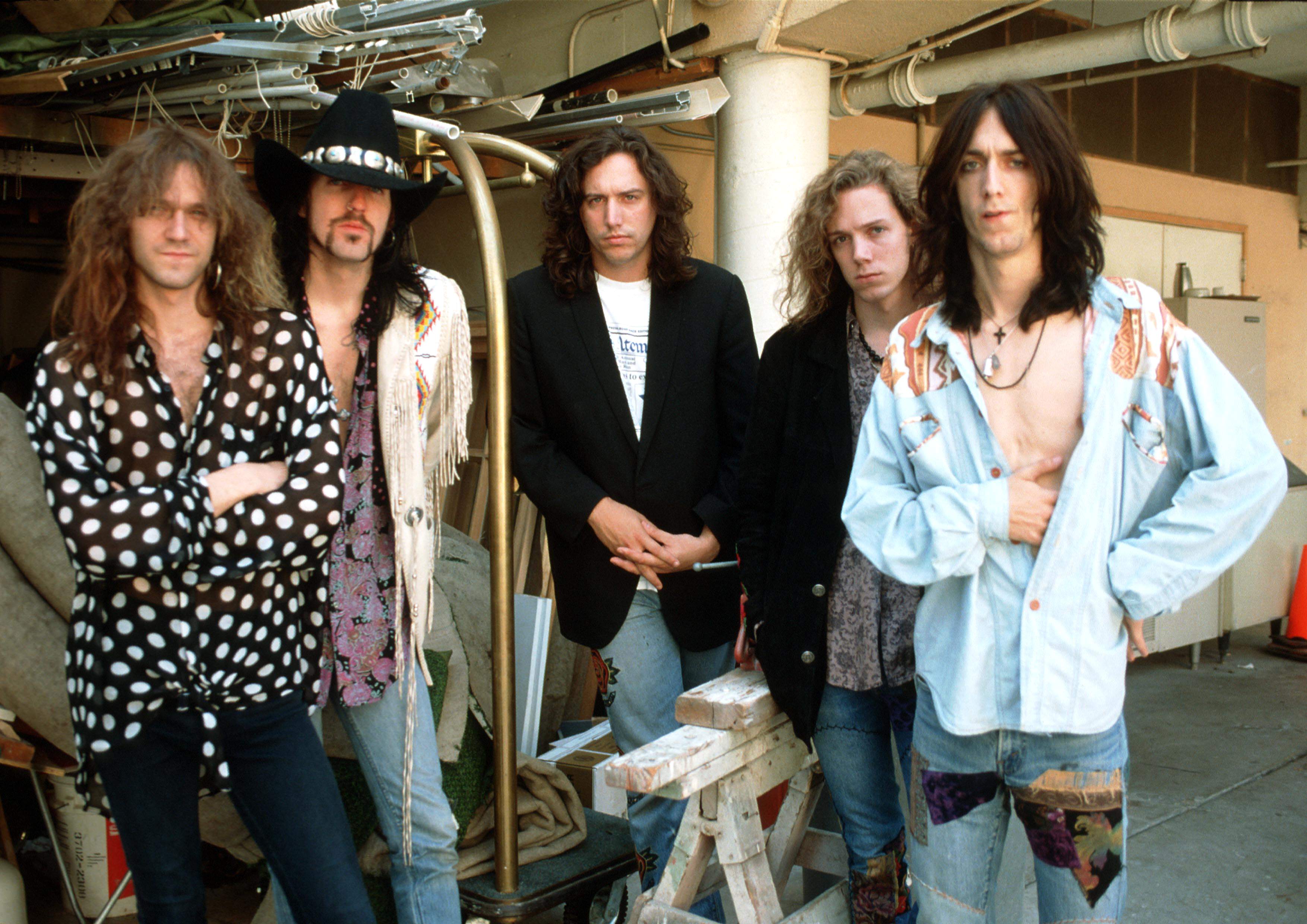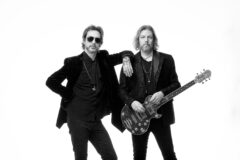This article originally appeared in the May 1991 issue of SPIN.
Chris Robinson, the Black Crowes’ very skinny lead singer, is standing in the band’s tour bus outside the Market Square Arena in Indianapolis. The Crowes have just finished another set as the support act on ZZ Top’s Recycler tour. When the band completes this tour in May, it’ll have been on the road for almost 16 months, and they’re beginning to look a little road weary. Drummer Steve Gorman has been complaining all day that he’s coming down with something; he even threatened to pass out during the after-show meet-and-greet session with Indianapolis’s radio dudes and dudettes. Chris Robinson is still hurting from the last three nights in Chicago, which included a visit from his girlfriend and late-night jam sessions with Albert Collins and the Kinsey Report at Chicago’s legendary blues clubs. It’s the middle of February, it’s been drizzling nonstop all day, and it’s dreary in a way that only someone who’s experienced the Midwest in the middle of February understands dreary.
Three teenage girls, major Black Crowes fans, have waited by the bus for a little meet-and-greet session of their own. Guitarist Rich Robinson, Chris’s younger brother, and the first to exit the arena, has invited them on the bus to wait until the other Crowes return. But get your mind out of the gutter, folks. There’s none of the groupie servicing I witnessed on a tour bus seven years ago while on the road with a Hollywood-based heavy metal band. (So what was I supposed to do? Stand up and yell, “Stop! You long-haired morons arc using these young girls” ?) No, Rich has invited the girls on the bus to talk; in fact, he’ll spend the next two hours on the phone, doing interviews with the Australian press. The Crowes treat their fans courteously and with respect. Earlier in the afternoon, they’d given a free ticket and after-show pass to one of the teenage guys who’d waited around their ritzy hotel for an autograph.
And, as I mentioned, these girls arc major Black Crowes fans. They know a lot about the group, having probably absorbed every article they can find on the guys. They’ve presented Rich with an unwrapped deck of Aleister Crowley Tarot cards. He seems appreciative, but informs us that bassist Johnny Colt is the member of the band who really knows Tarot etiquette, and will really appreciate the cards. Probably more than any other member of the Crowes, Johnny’s image is in line with the Keith Richards, “darker” side of rock. He has the dark features, a pierced nose, and on his finger a rat-head ring, which is reportedly part of a real rodent skull dipped in silver. “Someone sent me just the Death card in the mail once,” says Johnny, in reference to the Tarot cards. “I got rid of it fast.”
Speaking of rings, Chris Robinson wears the same type of skull ring on his finger that Keith Richards wears. But style-wise, he’s a little closer to the early glory days of Rod Stewart—tonight’s show featured Chris wearing a gorgeous bright-green velvet suit with a gold lamé scarf—and that’s true of his vocal style and onstage demeanor as well. During the show, he proves himself to be a classic strutter and stutterer—a little bit of Jagger but a lot of Rod the Mod. Still, it’s Keith that this band keeps returning to, be it Rich’s open-C guitar style onstage and on disc or Chris quoting the Rolling Stones bandleader to support a putdown of Swedish model look-alikes and recent chart-toppers Nelson.
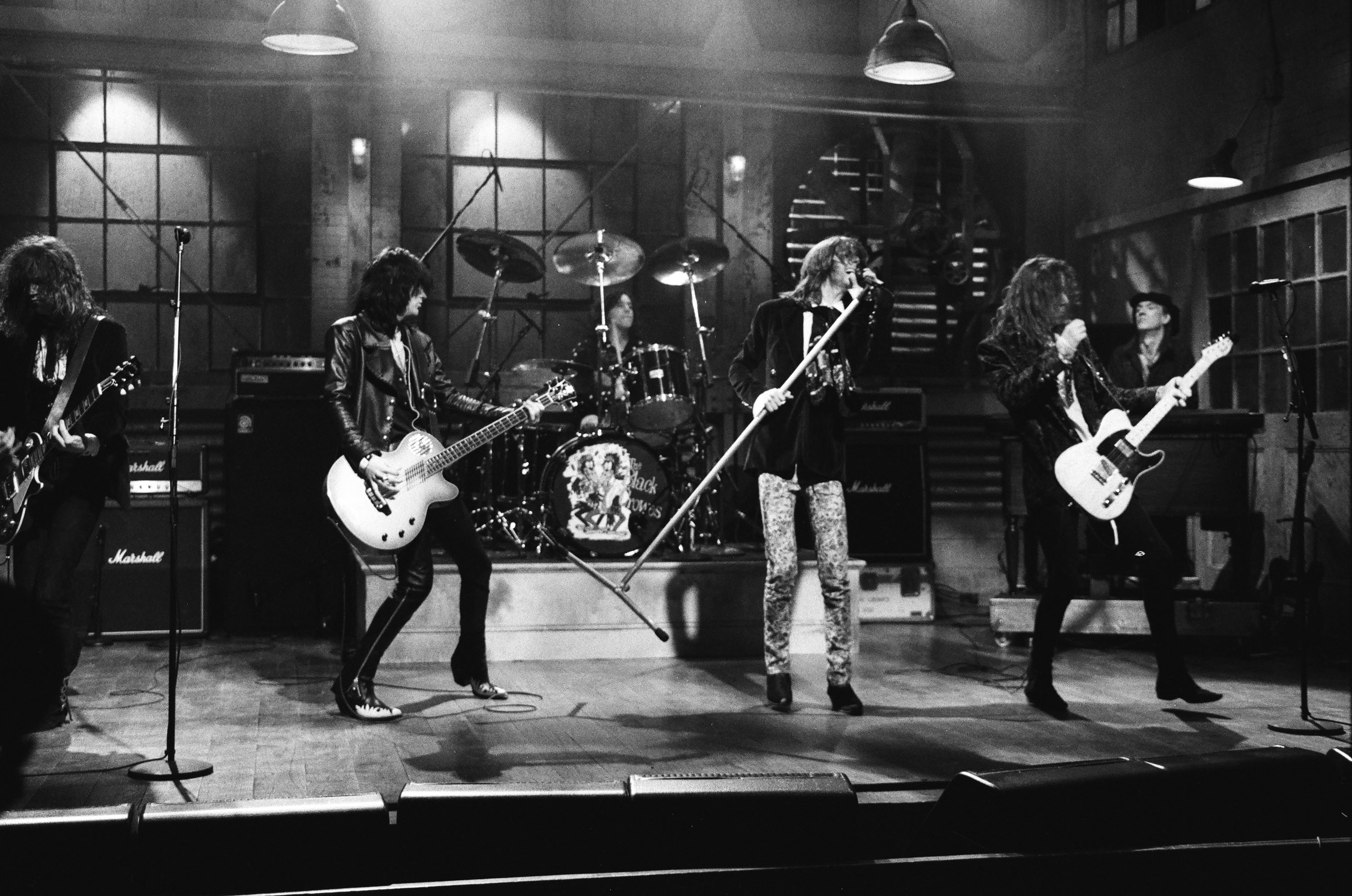
There are always two sides to every story. and the Black Crowes’ saga is no different. Some people seem to believe the Crowes are bringing back the blues-based, raw-edged, loud rock’n’roll that was originally popularized by bands like the Stones and, later, the Faces. Others complain that the Crowes are simply a poor man’s substitute for those who missed Exile on Main Street or A Nod’s As Good As a Wink to a Blind Horse the first time around. The Crowes have especially been reviled in their alternative-minded Atlanta hometown for evolving from a “punk band” called Mr. Crowe’s Garden that could barely play its instruments into what the Black Crowes have become today.
But then very few people are heroes in their own hometown, and the Black Crowes are rapidly becoming rock heroes everywhere else. The 16 months on the road, working as the support gig for Aerosmith, Robert Plant, and ZZ Top, have put the band’s career on the fast track. They’ve seen gradual upgrades—nicer hotels, a bigger bus, a bigger crew, bigger trucks. And by the time they hit Indianapolis, some of the arena security dudes backstage were speculating that the Crowes probably sold a lot of tickets for tonight’s first of two sold-out shows on their own appeal.
At present, the Black Crowes arc the biggest musical success story Rick Rubin’s Def American label has produced. Shake Your Money Maker has already gone platinum. “Jealous Again,” “Twice As Hard,” “Hard to Handle,” and “She Talks to Angels” have all become radio and MTV staples. The band has had a column devoted to it in Newsweek magazine, received a Grammy nomination for Best New Artist, and the morning after this first Indianapolis show the band will find itself featured in USA Today. Just a week ago, the Crowes were named Best New American Band in both Rolling Stone‘s readers and critics polls. In other words, the Black Crowes are hot.
The critic’s poll may be the biggest honor of the bunch. Metal magazines tapped into the Black Crowes very early on, but in the past 16 months the group has gained something most metal hits never gain—respect from both the critical and alternative communities. “See, I’m under the suspicion that we’re just the world’s biggest underground band,” says Chris Robinson.
“I don’t know that we did anything that different except play good songs and have a good front man,” adds younger brother Rich. “We just write songs and play them down to the bone, like Guns N’ Roses. Theirs may be a different kind music, but they just cut through the bullshit and fucking play. Just like Jane’s Addiction does, like Soul Asylum does, like Lenny Kravitz does.”
No matter what your take might be on this group, you have to admit it’s refreshing to hear a classic-lineup rock’n’roll band take Otis Redding’s “Hard to Handle” to the top of the charts in this synthesized, lip-synching era. I live in Los Angeles, and in L.A. there are tons of kids the same age as the Robinson brothers (Chris just turned 24; Rich is 21) whose rock’n’roll roots begin and end with Mötley Crüe. If you’re lucky, they may go back as far as Van Halen, or possibly Aerosmith. But in the case of the Robinsons—well, it’s been said that you can tell a lot about a person by their record collection, and these are just a few of the artists featured in the Crowes’ on-the-road CD collection (Chris, a confessed vinyl junkie, is said to have thousands of discs at home): Joe Cocker; Sly and the Family Stone; Hendrix; the Stooges; lots of Bob Dylan; lots of Neil Young; lots of the Stones; Marvin Gaye; the Wilburys; James Brown; Mississippi Fred McDowell; Deee-Lite; Muddy Waters; the Hypnotics; lots of Beatles; Lightnin’ Hopkins; Terry & McGhee; Ravi Shankar; Flying Burrito Brothers; Robert Johnson (a major obsession for both brothers); Booker T. and the MGs; John Lee Hooker; Cheap Trick; lots of Aerosmith; the Cure; lots of Replacements; lots of Rod Stewart; and a Japanese import of A Nod’s As Good… that they had to pay $45 to obtain. Not too shabby.
“Since I was a little kid, I knew who Otis Redding was,” says Chris, who claims that he learned all the parts to Sly and the Family Stone’s “Dance to the Music,” almost before he could walk. “I don’t know if that’s ’cause I’m from the South, or just that music means so much to me. Another friend said to me, ‘You know, you brought Otis Redding to the masses in a way that no one has before.’ I’m like, ‘What?’ And then I started thinking about it, and it was like, ‘Whoa! We did have the biggest version of “Hard to Handle.” ‘ Part of me feels good about that, and part of me thinks it’s a shame that people don’t know who Otis Redding is.
“I remember a time when you didn’t have the alternative charts, you didn’t have college music, you had rock radio where you heard everything from Ravi Shankar to the Stooges to the Rolling Stones. And kids who bought MC5 records bought Humble Pie records, bought Stones records, bought Led Zeppelin records. I still come across people who think Led Zeppelin is ‘kid’s music’: ‘Oh, I listened to that when I was a kid.’ Well, maybe you should put down the 10,000 Maniacs, which sounds like something my parents would listen to because it’s so fucking nice and sweet, and put on a Led Zeppelin record, ’cause that’s rock’n’roll music. They embodied so many different kinds of music, like the Stones did, from blues to country music to more ethnic music. And the way they interpreted it came out differently than the way the Stones interpreted it.”
In many regards, it could be argued that the Crowes are part of a long continuum that traces the blues as filtered through the Rolling Stones, then the Faces, then Aerosmith. The band leans much more toward standard blues references and hard R&B than it does toward the Chuck Berry riffs and grooves that made the Stones such kick-ass rock’n’roll icons. The Black Crowes are at least part of that long continuum that Bo Diddley encapsulated when he said, “Then all the white boys started playing it, and it became rock’n’roll.”
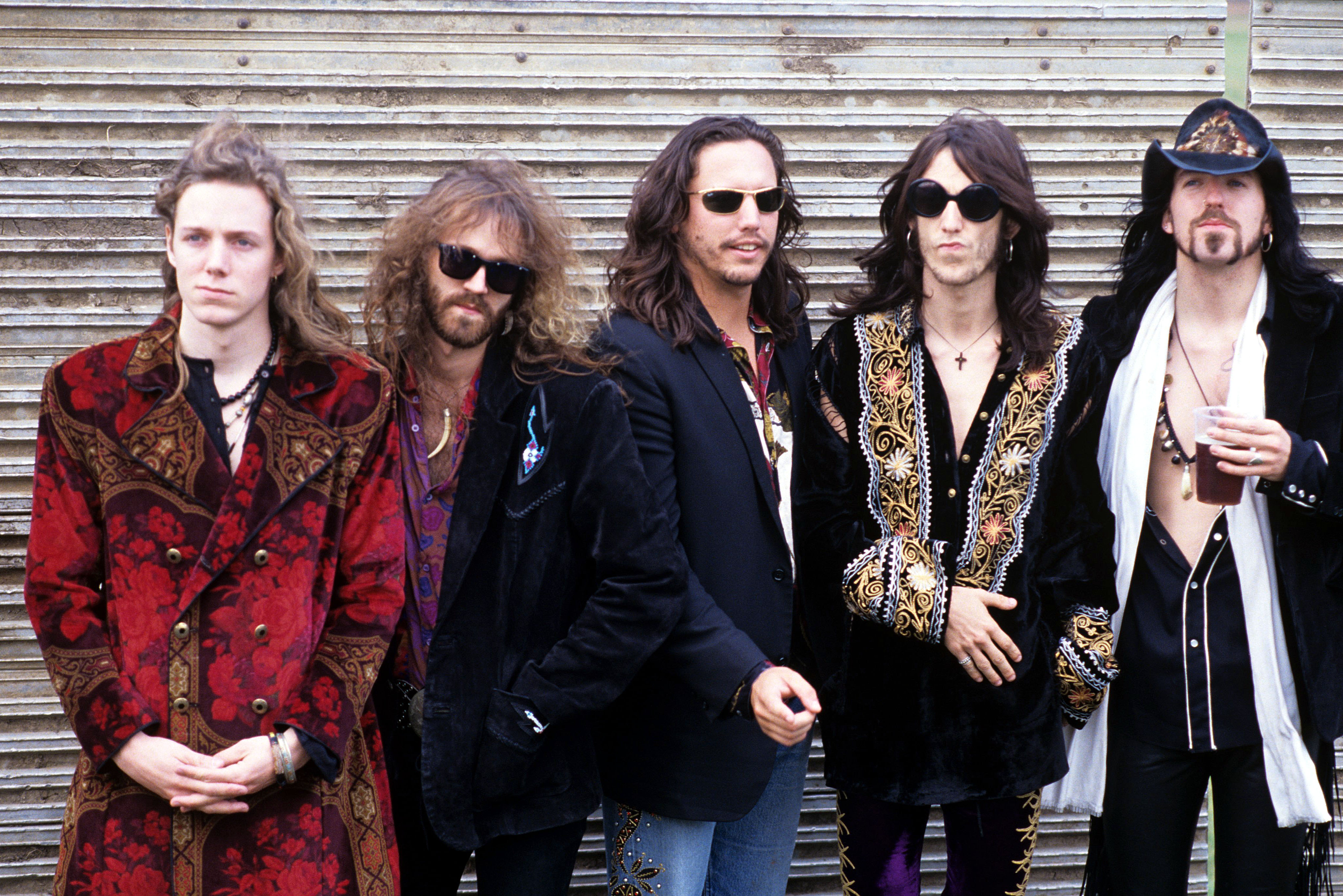
Onstage, The Black Crows can tell their first Indianapolis appearance is going over well. I’m sitting in the 12th row, and the person sitting next to me is the kid who’d been presented with the free ticket and pass from the band earlier in the day. He’s going wild; on his feet for the entire set, he’s whopping, stomping, and head-bangin’. He prefers stuff like the Crüe and Guns N’ Roses, although he listens to rap because his girlfriend likes it. And he loves the Crowes. “If it wasn’t for music,” he says, “I wouldn’t be here, man. For me, music is better than drugs.”
Most great popular bands have had great logos, from the Stones’ tongue to the Doors’ 3-D lettering to the Monkees’ guitar … and the Black Crowes have a great logo. Of course, the two drunken birds in Alan Forbes’s design do make Rich and Chris, in Rich’s own words “kind of look like Woody and Keith.” Or it might make you think of the Glimmer Twins themselves. (“Our bassist calls us the Rotten Twins,” says Rich.) But for all the Stones-like characteristics, the backstage scene at the Market Square Arena looks less like Cocksucker Blues than it does a reflection of ’80s temperance. Chris even drinks Evian water onstage during the performance.
Earlier in the day, I was sitting in the dressing room as Humble Pie’s Rock On blasted from the stereo at near-Spinal Tap levels. The five band-members went into the next room to work on a new song called “Thorn in My Pride.” (In fact, they introduced two new songs onstage that night.) Shortly thereafter, their road manager asked me to vacate the premises because the Crowes wanted their “privacy.” He explained that their girlfriends were in town and such, although the only girlfriend I met was second guitarist Jeff Cease’s fiancée, Mary, who was very conversational at first, but who I have a sneaking hunch was later told not to tell me things about the band.
In fact, a member of the band’s crew told me that day, “Anything you hear me say, Bill, is off the record,” even though he didn’t say anything that could be interpreted as offensive the entire night. Another crew member explains: “They had a birthday party, and a stripper appeared. It got reported in one of the magazines, and some of these guys are married or have serious girlfriends.” All this talk of privacy isn’t to say the Black Crowes aren’t nice, friendly, and still young enough to be totally unaffected by their sudden success. It’s just that I don’t think the band—and Chris in particular—is completely comfortable with the press. After all, as I said: Cocksucker Blues this ain’t.
“We didn’t let you in our other room,” Chris cackles the next day, “because we’re still young enough to touch the hot light bulb when we’re told not to. The Black Crowes do enjoy their vices, but no one misses a gig. That’s part of being a Southerner. I was in L.A., and Timothy Leary toasted us to the decadent South. But you have to have it together. I don’t think anyone wants to wake up a junkie in seven years with their teeth falling out. I think dental work keeps us from being big drug abusers.”
Rich makes apologies for the Evian water onstage the night before. “We weren’t allowed to have alcohol onstage. It’s some weird law where you can get arrested. And we were preoccupied, working on a song. Normally, it’s a lot different.” I had already been told that Rich neither drinks nor does drugs.
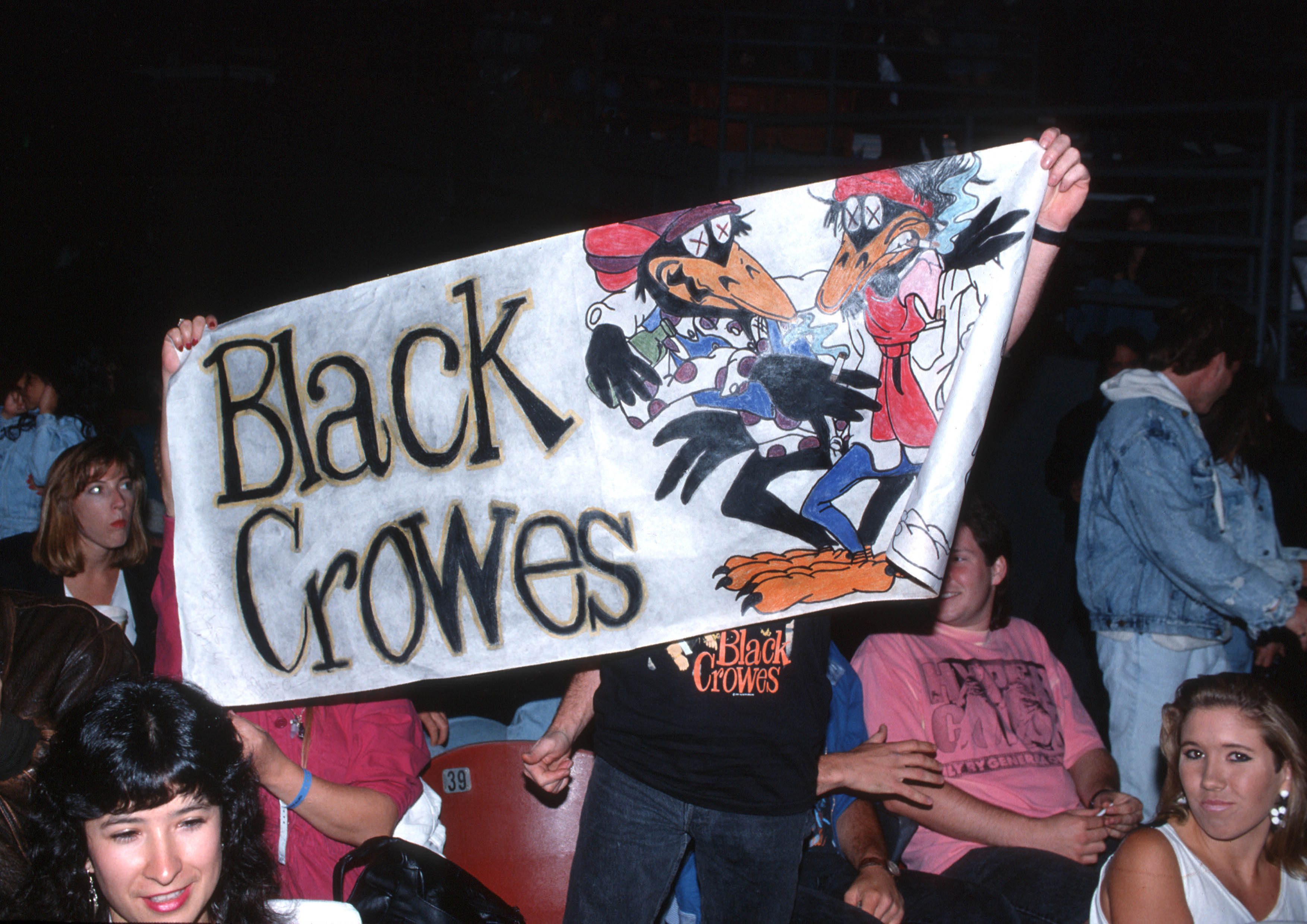
The Black Crowes were basically born when Steve, their drummer, joined up with the Robinson brothers. At the time, he was in the Atlanta alternative band, Mary My Hope, and living in the same house as Chris. The band became popular on the college scene, eventually drawing 15,000 to their gigs.
“I feel bad for them because they get a lot of shit now in Atlanta,” says George Drakoulias, the A&R man who spent two years trying to sign them to A&M (“We weren’t metal enough,” claims Rich) before hooking the band up with Def American. “There was no sell-out here. It wasn’t a contrived thing. This is the kind of music these guys wanted to make. But Atlanta is a small town with lots of gossip. Nobody wants to see anyone get real successful.”
“A lot of people are saying, ‘Oh, you guys are doing this to sell records.’ But it’s like, ‘Where the hell were you the past three years when we were getting better at our instruments, writing different songs, listening to different music, and expanding?'” says Rich. “R.E.M. was eighty miles north of us, and it created this snotty music scene. When we started just playing our music, that’s when people stopped coming to see us, because they were hanging out and sipping cappucino.”
It should be noted that Rich and Chris are the proverbial yin and yang. Younger Rich is quiet, introspective, obviously very intelligent. Singer Chris, meanwhile, is a nonstop talker, whose thought patterns seem to weave all over the place and back again. Says Rich, “I’m the protective younger brother ’cause Chris is so flaky. Which is cool. He’s a front man. He needs to be. He doesn’t need to worry about shit. I’ll do the worrying.” As for his big brother’s feelings on the subject: “I always wanted to be a rock star,” admits Chris. “Another novel concept! A rock star.
“Let’s be honest, it is the age of MTV,” he continues. “I’ve never put great stock in MTV, but then again . . . I’ve never dressed like everyone else. Like when I was a kid and Steve Tyler said, ‘Wearin’ all the things that nobody wears.’ I went, ‘Yeah! Alright!’ We like clothes. Anything that Keith Richards wore was gospel. I mean, I’m not going to lie. I think what it is—you have some people who are great players, but maybe they can’t write tunes and don’t have any style. Then you have people who can write tunes, but they can’t get onstage and get their point across. And then you have people who look good, but can’t do any of the other things. I’d like to think that we have quite a bit of all three going for us: five young guys playing rock’n’roll that’s interesting and thought provoking.
“The thing that pisses me off is that the music scene in Atlanta is going to sit around and go, ‘Oh, they sold out.’ Yeah, I sold out! I sell out here, I sell out there. I sold a million records. Fuck, yes, I sell things. But don’t say that I’ve done anything to make me wake up feeling dirty and used. I’ve never understood the alternative mentality that you shouldn’t play to as many people as you can. We get hassled because we’re musicians now, and we weren’t for a long time. It took a year of playing every night.”
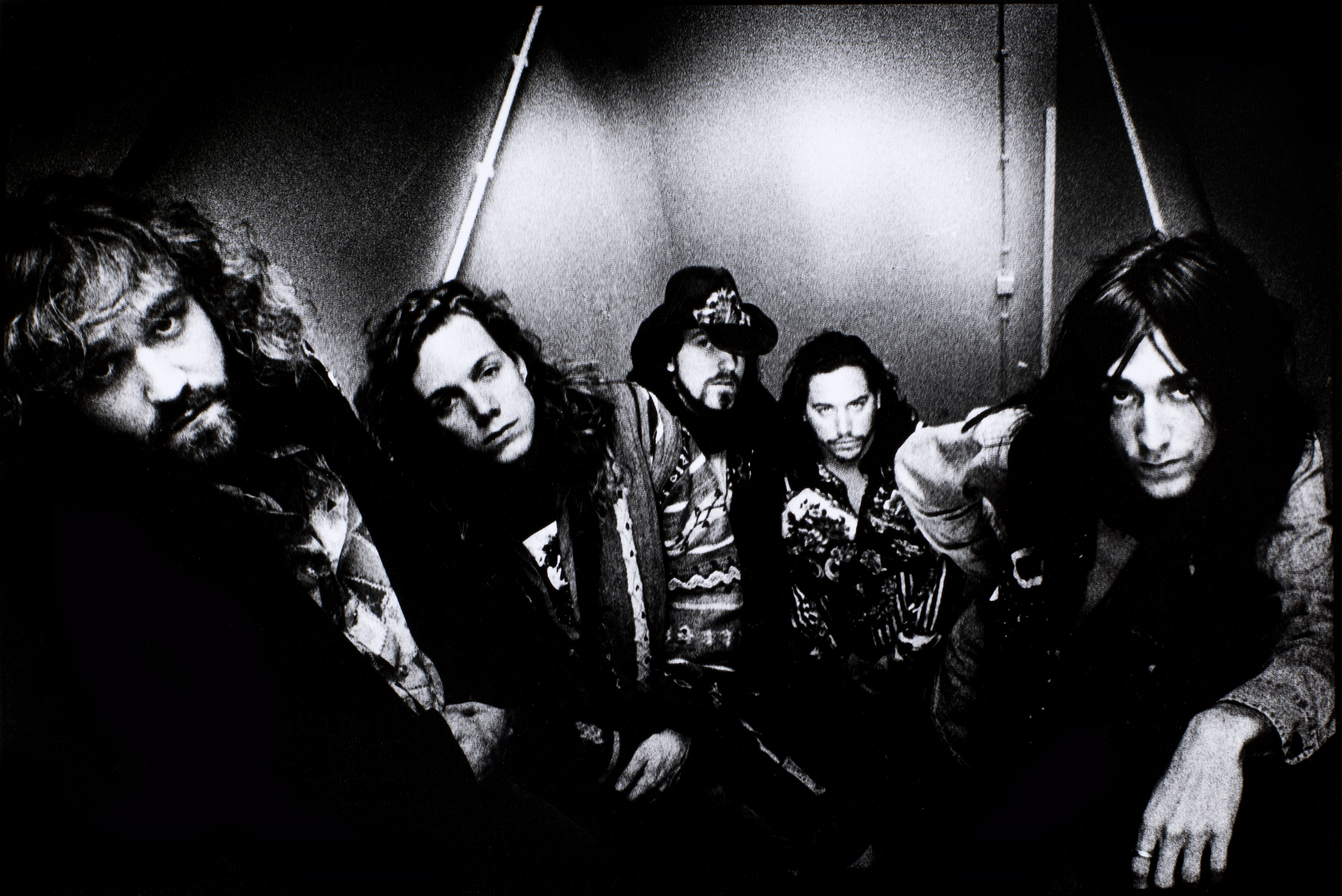
After the first show, back on the bus. The three girls have left, and we’re headed toward the hotel. “Hey, Bill, what you’re about to see is totally off the record,” says one of the crew; he then kneels down, as another crew member throws a football-shaped wiffle ball, aiming for his open mouth. The Crowes are being very cordial to the invading writer, especially Rich, who has really opened up in the last several moments. He asks me if I’d like to take the Tarot cards, then thinks better of it. “Actually, Johnny knows the proper way to dispose of them. You gotta follow etiquette.”
So these guys are really into this voodoo stuff?
“It’s just an interest of some people in the band,” says Rich. “It’s the same way that someone would be interested in Anne Rice’s Vampire Chronicles books, or a guitar, or the Civil War. But then someone blew it out of proportion, and made it sound like we kill chickens and goats. And then Hard Copy or one of those shows did a story on us being satanic…”
“It all had to do with a journalist coming up with an angle,” says Chris, amused but sarcastic at the same time.
And as Johnny complains that he had to pour his Jack Daniel’s into a Coke can in order to take it onstage tonight, he dips into a large jar to share a simply sinful substance with me. The jar is full of chocolate-chip cookies which a girlfriend has baked for him, and the sweet things taste damn near divine.

